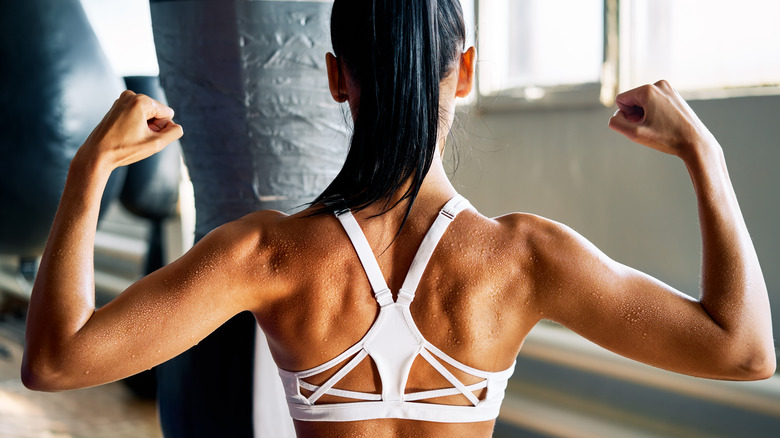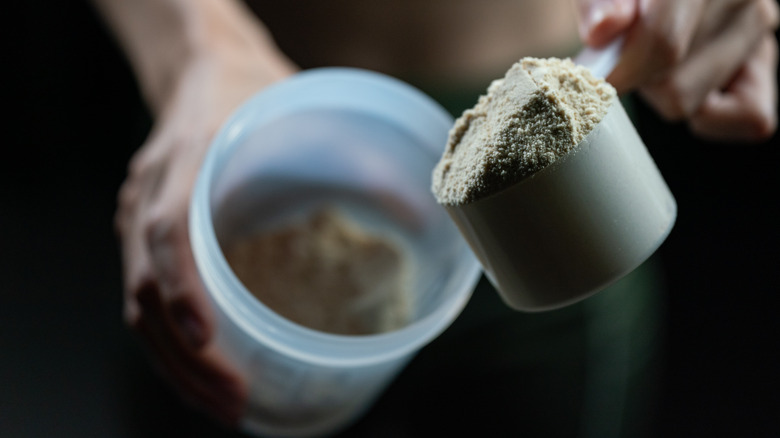What You Should Know Before You Start Bodybuilding
You know those people at the gym who spend half an hour on the bench press and then haul their jug of water to their next exercise. You may somewhat envy them, but your tight schedule might not allow several hours a day to rack the weights. Still, you might be curious about how to build a little more muscle.
According to Byrdie, bodybuilding involves purposely using exercise to develop the muscles to improve your physique. Because it's based on aesthetics, it requires body symmetry, which means all body parts are proportional to one another. Even in women, bodybuilders aim for the V-taper that makes the waist look smaller.
Bodybuilding is also a sport that requires months of training and a specific diet tailored to the competitor's division. Female bodybuilders will chisel their bodies for bikini and figure competitions (per Shape). Even if a bodybuilding competition isn't your goal, you can still reap the benefits of building a strong body. A 2012 study in the Chinese Journal of Clinical Psychology found that two months of bodybuilding training can improve your social confidence and body confidence. According to a 2013 study in the Journal of Extension, strength training twice a week for 10 weeks improved the body image and quality of life among older women who lived in rural communities.
The two main components of a beginning bodybuilding program are training and diet. Both can help you build muscle while also losing fat.
A beginner's bodybuilding training program
Building a strong body doesn't necessarily mean spending hours at the gym. You can still get a rock-hard body by focusing on quality training. Six-time Mr. Olympia Dorian Yates spent less than an hour four days a week to become a professional bodybuilder, according to BodyBuilding.com. Trying to build too fast is a big mistake, according to Muscle and Fitness. Unless you have significant experience with lifting weights, this won't happen without significant injury or burnout. It's best to take a long-term approach.
Dedicate at least three nonconsecutive days a week for strength training. This is called a three-day "split." Once you gain a little more experience, you can add extra days. When building muscle, you'll need days off between strength training days for your body to recover.
Choose two exercises per body part, and do three sets of eight to 12 repetitions of the exercise. Try to vary the exercises each time. For example, one week you might choose a lat pulldown machine and a seated row machine for your back exercises. The next week, you may opt for single-arm cables for the pulldown and a dumbbell row on a bench. You can choose two body parts for each training day. Mondays might be your legs and core day, Wednesdays can be for your chest and arms, and you can work back and shoulders on Fridays.
A bodybuilder's diet
Your six-pack abs don't start at the gym — they start in the kitchen. Although some weightlifting exercises are good for weight loss, you'll still need to adhere to a healthy diet. Ideally, you should not aim to lose too much weight too fast. If you cut back your calorie intake too quickly, you'll lose lean body mass. It's best to take this step slowly, as you'll lose more fat while keeping the muscle.
According to a 2014 study in the Journal of the International Society of Sports Nutrition, it's best to aim to lose no more than 1% of your current body weight each week. You'll also need to consume plenty of protein — about one gram of protein or more per pound of body weight. You might think that you need to cut out carbs or follow a keto diet, but this is a myth. You'll still need to include almost two grams of carbohydrates per pound of bodyweight to be sure your body doesn't go into starvation mode — you could lose your hard-earned muscle that way. Similarly, a diet that's too low in fat could upset your hormonal balance, so stick to a fat intake of 15-20% of your overall calories. Because each person's body is different, it's best to consult with a dietitian to be sure you meet your daily caloric needs.



